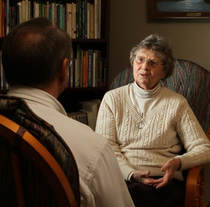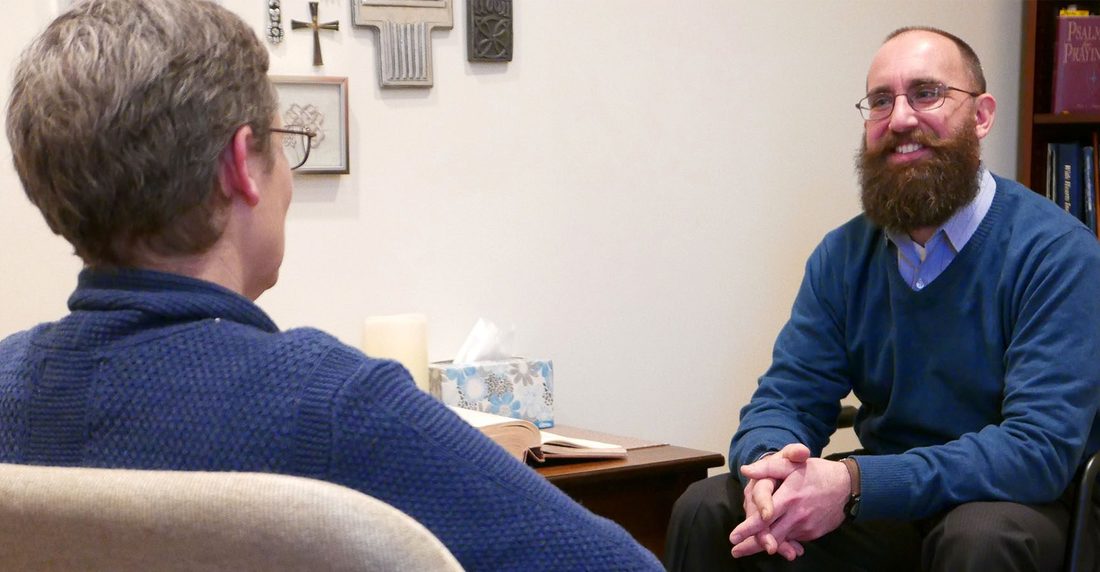
Have you ever had one of those experiences when seemingly everyone is talking about a book you haven’t read or a person you’ve never even heard of? When this happens for me in the realm of spiritual things, I feel especially left out. There was a time I felt this way about “spiritual direction.” Perhaps I surmised it was some form of companionship for the spiritual life, but I really didn’t know what people were saying. Since then I have grown to appreciate spiritual direction so much that I don’t want others to feel left out. With this short essay I want to help those who are unfamiliar with the practice find a place to begin.
I suggest we treat the topic just like we would in real life--conversationally. I’ll offer my experience as a spiritual director (about ten years) and as a person in spiritual direction (about twenty), and you can weigh my perspective against what you have come to know along the way. I hope you’ll even chime in with your questions and comments below.
Allow me to give you a bit of a back-stage pass to a first in-person meeting with a spiritual director. This one-on-one setting is my favorite for the conversation, especially when I have the privilege of welcoming someone brand new to spiritual direction. I listen for the important threads in people’s stories and answer each question as frankly as possible. No two conversations are exactly alike, but most of them unfold something like this....
What is Spiritual Direction Anyway?
At its core, spiritual direction is “companionship in your ever-deepening relationship with God.” You have likely had other similar companions (pastors, mentors, soul friends). These kinds of relationships, whether formal or informal, are essential to our lives. Personally, what I look for in a spiritual is someone who is trustworthy and intentional. She or he does not have to be a pastor or professional, but I do want a companion who is trained to approach spiritual direction in a way that helps me pay better attention to how the Spirit is working in my life.
Before we get too far, I’d also like to risk saying that spiritual direction may not be for everyone at every season of their lives. Part of me resists that disclaimer because I value the practice a great deal, personally, and because I see the fruit it bears in other people’s lives. Even so, not everyone feels drawn to spiritual direction at this time, and I trust that the Spirit is perfectly capable of stirring in people’s lives anyway. If you are a person that just isn’t sure spiritual direction is right for you, I encourage you to learn a little bit more and tuck it away in your spiritual toolbox, so that it’s available if and when you do become drawn to it. Spiritual direction won’t fade away. For centuries it has served seekers from all walks of life.
What Brings a Person to Spiritual Direction?
People like you and me inquire about spiritual direction when life changes in ways that are outside of our control, when we are trying to find a way forward and things are still fuzzy, when our old ways of praying don’t seem to be feeding us, or when we are just plain looking for “something more.” If you are now or have ever been in one of these places, know that you are standing among many honest companions.
For as often as inner restlessness and outer transitions bring people to spiritual direction, there is something even more common—the recommendation of a friend. Sometimes the people around us notice before we do that it’s time for us to be paying closer attention. I hear regularly that what brings a person to spiritual direction was someone who said, “I recommend you consider meeting with a spiritual director about this. All I can say is it’s been helpful to me.”
What Happens in Spiritual Direction?
What you probably want to know is, “What in the world would we do for an hour?” and that’s a fair question. There are some common elements. Whether people are meeting one-on-one or in a group, they generally experience some mixture of quiet, prayer, speaking, listening, and wondering out loud. It’s a little hard to predict how any particular conversation might unfold, but my experience tells me that we can trust the Spirit to be stirring in that sacred space, whatever happens.
At the beginning of a session, some people like to dive in and start talking about an experience or question they have been pondering. Others like to take a couple minutes to settle down from the drive and figure out what they might like to discuss on a given day. I have had a person sit in silence for 60 minutes and I have had a person speak non-stop for 60 minutes. Not incidentally, both told me that session was the best they had ever had!
The positive experiences of these two individuals—from the extremes of silence to speaking freely—suggests to me that people are longing to be heard and to be accepted wherever they are on the spiritual path. Spiritual direction serves this deep desire by holding a safe place for silence, attentive listening, and whatever helps us pay attention to God’s presence this day.
What About the Cost for Spiritual Direction?
At the Benedictine Center, we suggest a donation of $75 per hour for one-on-one spiritual direction and $45 for group spiritual direction. Some people give more and some people give less, but almost everyone contributes something for two reasons. First, donations allow the Benedictine Center to keep making professional staff available for important conversations. Your contribution honors the fact that these staff members have financial responsibilities to their families and communities. Second, people tell us, “Making a donation is like investing in my spiritual life.” The contribution seems to help people prioritize this practice and commit to taking it seriously.
I encourage you to consider a contribution that is both personally meaningful and sustainable. And, if the cost is still a hurdle, let’s talk about a scholarship of some kind. Truly, I have never heard of someone being turned away because of money.
How Do I Connect with a Spiritual Director?
You’re not starting from scratch, at least. The fact that you have made it this far means you also have at your fingertips both more information about spiritual direction, plus biographies for at least a few spiritual directors! Poke around a bit and see what resonates for you. You might also reach out to friends, leaders in your faith community, or other places like the Benedictine Center to get in touch with a spiritual director.
Once you identify someone, nothing beats an initial no-strings-attached conversation (many spiritual directors even offer such meetings for free, like we do at the Benedictine Center). You get a chance to tell your story, ask some questions, and see how the person responds. If you’re like me, you’ll soon sense whether this person feels like a good fit. Does it seem likely that her/his tone, comments, and questions will help you deepen your relationship with God? If so, try meeting with this person three times and then re-evaluate. Otherwise, nothing is lost in asking this person for a recommendation or two. Keep interviewing directors until you find someone with whom you find a good connection. Meeting with more than one person allows you to experiment with different styles and, importantly, to listen for the different ways you tell your own story.
One thing more: trust that the Spirit is at work in this process. Already something is bolstering your curiosity and courage, so be patient as things continue to unfold. Your relationship with God is worth the search for a companion who will walk this journey with you.
Now What?
Wherever you are in the process, I would encourage you to take this step: Practice solitude with God. No one, not even the best spiritual director, will ever walk your path for you. Your relationship with God already deserves your attention. Spiritual direction may provide a setting for you to explore and express your experience with God, but it will never take its place.
After all this, my hope is that you’ve gained enough familiarity with spiritual direction that you don’t feel left out. If you’re ready to proceed with spiritual direction, contact the Benedictine Center or a spiritual director for an initial meeting. If you’re still pondering, take your time. We’re not going anywhere and there are plenty of resources online for you to continue exploring. We’ll drop some helpful links below.
Blessings on the journey and in your conversations!
Sam Rahberg is the Director of the Benedictine Center and a member of the spiritual direction team. This article posted with permission from the blog at the Benedictine Center of St. Paul's Monastery.

 RSS Feed
RSS Feed